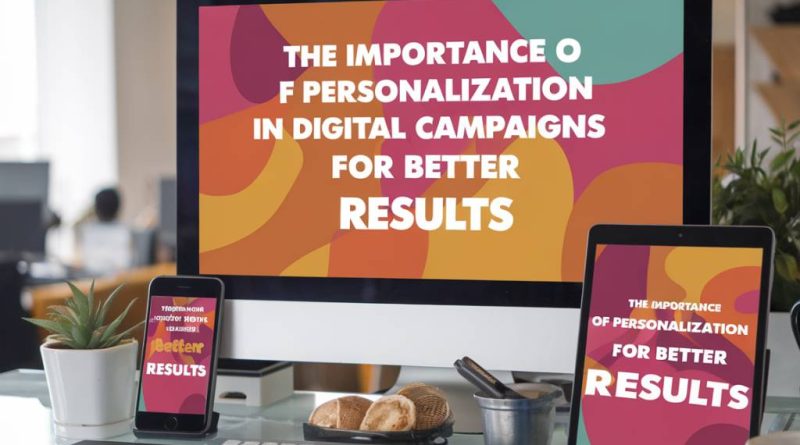The Importance of Personalization in Digital Campaigns for Better Results
In today’s digital era, personalization has emerged as a critical strategy for businesses aiming to enhance their marketing and communication efforts. The ability to deliver tailored content and experiences to users significantly impacts the effectiveness of digital campaigns. In this article, we’ll explore the importance of personalization in digital marketing and how it can lead to better results for businesses.
Understanding Personalization in Digital Marketing
Personalization in digital marketing refers to the practice of using data and analysis to create individualized experiences for users. This can range from personalized emails to tailored product recommendations and customized website content. By leveraging data such as browsing history, purchase behavior, and demographic information, marketers can deliver messages that resonate more deeply with their audience.
The Benefits of Personalization
Implementing personalization in digital campaigns offers numerous benefits, including:
- Improved User Experience: Personalized content is relevant and engaging, creating a more enjoyable experience for users. This leads to higher satisfaction and increased loyalty.
- Higher Conversion Rates: When users encounter content that speaks directly to their needs and preferences, they are more likely to take action, whether making a purchase, signing up for a newsletter, or downloading a resource.
- Increased Engagement: Tailored content encourages users to interact more with your brand, increasing time spent on your website, social media, or other digital platforms.
- Better ROI: Targeted marketing efforts mean that resources are used more efficiently, resulting in a higher return on investment for your campaigns.
Now, let’s delve deeper into how personalization can be applied in various digital marketing channels for better results.
Email Marketing
Email marketing is one of the most effective channels for personalization. By segmenting your email list based on user data, you can send targeted messages that address the specific interests and needs of different audience segments. Personalization in email marketing can include:
- Using the recipient’s name in the subject line and body of the email for a personalized touch.
- Sending product recommendations based on previous purchases or browsing history.
- Providing tailored offers, discounts, or content based on user behavior and preferences.
These tactics can lead to higher open rates, click-through rates, and conversion rates, as recipients are more likely to engage with content that is relevant to them.
Website Personalization
Your website is another critical platform where personalization can significantly enhance the user experience. By leveraging data and AI-driven insights, you can customize content, product recommendations, and user journeys. Examples of website personalization include:
- Dynamic content that changes based on user behavior or demographics.
- Personalized product recommendations on the homepage or product pages.
- Customized landing pages for different audience segments.
By providing a tailored experience, you can increase user engagement, reduce bounce rates, and boost conversions.
Social Media Marketing
Social media platforms offer unique opportunities for personalization due to the wealth of data they collect on user behavior and preferences. Personalization strategies on social media can include:
- Targeted advertising based on user interests, demographics, and online behavior.
- Customized content that resonates with specific audience segments.
- Personalized interactions and responses to engage with users on a more personal level.
These tactics can help build stronger relationships with your audience, increase engagement, and drive more traffic to your website or other digital assets.
Challenges and Considerations
While personalization offers many benefits, it also comes with certain challenges and considerations:
- Data Privacy: Collecting and using personal data responsibly and ethically is crucial. Ensure compliance with data privacy regulations such as GDPR and CCPA.
- Data Management: Effectively managing and analyzing the vast amounts of data required for personalization can be complex and resource-intensive.
- Consistency: Maintaining a consistent brand voice and message across personalized content is essential to avoid confusing or alienating your audience.
Future Trends in Personalization
As technology continues to evolve, so do the possibilities for personalization. Emerging trends that are set to shape the future of personalized digital campaigns include:
- Artificial Intelligence and Machine Learning: AI and ML can enhance personalization efforts by providing deeper insights and enabling predictive analytics to anticipate user behavior and preferences.
- Omnichannel Personalization: Delivering a seamless, personalized experience across all channels and touchpoints, from online to offline, will become increasingly important.
- Interactive and Real-Time Personalization: Interactive content and real-time personalization can engage users in new and exciting ways, providing instant gratification and relevant content.
By staying ahead of these trends, businesses can continue to refine their personalization strategies and achieve even better results from their digital campaigns.
In conclusion, personalization is no longer a nice-to-have feature in digital marketing; it is a necessity. By tailoring content and experiences to individual users, businesses can significantly enhance their marketing efforts, foster deeper connections with their audience, and achieve better overall results. As technology advances, the opportunities for personalization will only grow, making it an essential component of any successful digital marketing strategy.




